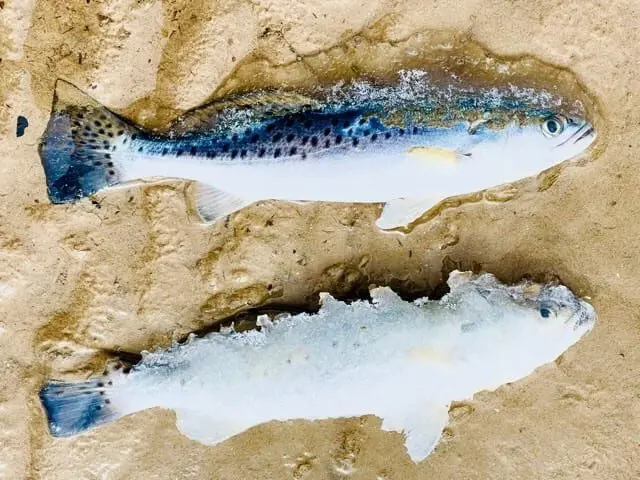Story and photo from TPWD
Freezing events along the Texas Coast are rare, but extreme cold temperatures can be a natural cause of fish kills. If fish do not make it to refuge in deeper, more temperature stable water in cold weather, they may die when water temperatures reach a certain threshold. For example, spotted seatrout experience more mortalities associated with freezing weather than other common game species.
Currently, TPWD is seeing localized fish kills in affected bay systems and receiving reports of areas with dead fish from guides, anglers, and other boaters along the coast. Initial reporting of fish mortality occurred February 14, 2021. The quantification of impacts to fish is still ongoing. Rapid assessments indicate the majority of fish (by number) impacted were non-recreational species including pinfish, spot, silver perch, gulf menhaden, mullet and other foraging fish. Recreationally important species impacted do include spotted seatrout, red drum, sheepshead, grey snapper, snook, black drum, and tarpon.
The geographic extent of fish kills includes the entire Texas coast, but at this point it appears as if bay systems south of Galveston Bay received most of the impacts. The majority of the kills were located along the southern shores and undeveloped areas such as the back sides of the barrier islands (Example: Pringle Lakes of Matagorda Island). There appears to be differential impacts often seen in various freeze events. Areas such as Pringle Lakes and south of 9 Mile Hole at the Land Cut in the Laguna Madre appear to have higher proportions of game fish impacted. Bay system specific impacts are listed below.
Sabine Lake
- Reports of fish kill in Keith Lake system of Sabine Lake. Game wardens reported seeing red and black drum in addition to some sheepshead.
Galveston Bay Area
- Fish kills reported over a 3-5 mile stretch in the Gulf Intracoastal Waterway (GIWW) near Christmas Bay, a 9 mile stretch of the GIWW from Swan Lake to Bastrop Bay. Minimal impact with species observed included mullet, sheepshead, small spotted seatrout, red drum.
- Fish kill observed in a dead-end canal system in Village of Tiki Island and Jamaica Beach TPWD observed numerous dead mullet floating and a number of other unidentified fish on the bottom of the canal. TPWD retrieved several fish off the bottom from Jamaica Beach with nets. All fish recovered were mullet.
- TPWD surveyed areas of Christmas Bay and Cold Pass approximately 2.50 miles and observed no dead fish
Matagorda Bay
- Fish kills in Carancahua Bay, East Matagorda Bay, Magnolia Beach, Matagorda Peninsula, southern shoreline of the GIWW to West Matagorda Bay, Turtle Bay, Port O’ Connor public beach and pier, canals at Sargent, Keller Bay, Lavaca Bay. Multiple species observed.
San Antonio Bay
- Fish kills observed at the Matagorda Island shoreline, Pringle Lake, southern shoreline of San Antonio Bay. Pringle Lake was hit especially hard with a larger proportion of game fish observed.
Aransas Bay
- Fish kills observed throughout Aransas Bay system including Lighthouse Lakes kayak launch, Hwy 361, Airport Park Pt. south to Copano Village, Copano Causeway, Bahia Bay canals, Camp Aranzazu, Ransom Channel boat ramp, GIWW adjacent to Redfish Bay, Mud Island, Cedar Bayou, and southern shores of Mesquite Bay. Multiple species observed.
Corpus Christi Bay
- Fish kills observed in the Nueces River tidal near Labonte Park. Species included several snook and tarpon.
- Fish kills observed Corpus Christi bay, community parks along Ocean Dr., and sunset lake. Multiple species observed.
Upper Laguna Madre
- Fish kills observed in Padres Island canals, shoreline near Clem’s and Billings boat ramps, shorelines in Lake Padre, Upper Laguna Madre near JFK causeway, canals of North Padre and Tropic Isles, Land Cut, and Baffin Bay. Multiple species observed with areas particularly hit hard being the Land Cut area.
Lower Laguna Madre
- Fish kills observed in Port Mansfield area, Arroyo Colorado, Brownsville ship channel, Long Island commonly known as the “Y”. Multiple species observed.
Coastal Fisheries Division biologists will continue to make on water assessments into the week of Feb. 22-26. While ongoing assessments can provide some estimates of the magnitude of this event, biologists will be able to present a more accurate assessment of the impacts on particular species as routine monitoring (gill nets, bay trawls, and bag seines) continues and they are able to benchmark numbers against sampling efforts from previous years. For many of the key game species, informative data will start coming in with spring gill net sampling which runs from mid-April thru June. Additionally, as a part of year-round survey efforts, biologist will soon begin collecting information from recreational anglers at boat ramps. This data will provide additional information regarding the impacts of this cold-weather event and will help inform what management actions, if any, are needed to help accelerate recovery of fish stocks.


